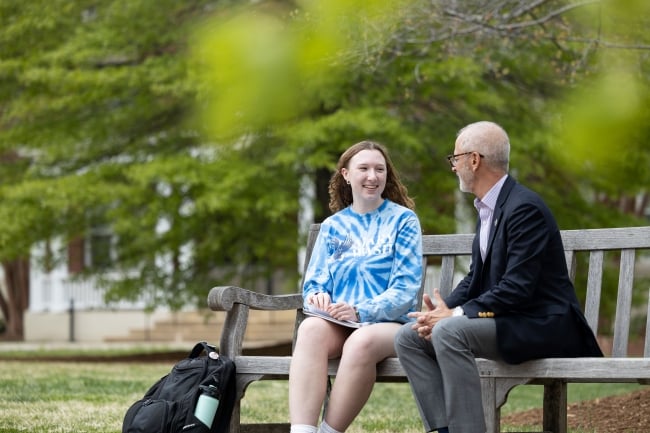You have /5 articles left.
Sign up for a free account or log in.

President Troy Paino tries to be himself when talking with a student, rather than being “presidential.”
University of Mary Washington
As a university president and introvert, I seek out those genuine conversations that re-energize me in this work. Getting into the deeper conversations, whether it’s in a classroom, in a student government meeting or with colleagues, fosters the human connection that we may miss in small moments or large gatherings.
This is especially true with students. In our rush to fulfill our responsibilities to the myriad of constituents we serve, it is easy not to give students what they really need from their university president: an opportunity to witness their full humanity.
It is important to attend athletic competitions, musical and theatrical performances, public lectures, and a variety of other student events and activities, but on those occasions, I often feel like I am merely playing a role. Finding the time to let students share their stories in more intimate conversation creates a deeper bond and stronger sense of community. Ideally, you get to the point where they no longer see you merely as their president, but as another human trying their best in a complicated world.
To do that, Kelly, my wife, and I have regular student dinners at our university residence. Students enter a lottery each month to spend an evening with us over a meal. The conversation is a little stilted to start (after all, up to that point they only see me as their university president), but as they start to share their stories, something magical happens and we begin to feel genuine affection for one another despite our differences.
These conversations with students, always full of laughter and occasionally a few tears, serve as a necessary antidote to the exhaustion I often feel from my other responsibilities. If you are like me and long for this deeper connection with students, I recommend the following:
- Be intentional. At the beginning of each year, schedule the time and place for where you can have honest conversations with students. For me, it is the most important event on my calendar each month.
- Be authentic. As a president, it is easy to get caught up in the role you are hired to play, especially around students. How many times have we heard, “Be presidential”? In this space, be yourself.
- Be vulnerable. Once they see that you, too, have experienced the span of human emotion (self-doubt, love, embarrassment, joy, anxiety, grief, regret, uncertainty and gratitude), you can see their view of you and the world subtly change, creating an environment where they too can be more open.
- Be mindful. This is a time to put your other worries aside and be present for these students. In this space, they are your only concern. Stay in the moment and listen to what they are sharing.
- Be curious. Take this ride with them and ask them questions that show your genuine interest in their lives.
- Be nonjudgmental. Unlike meetings you have throughout your day, here there is no agenda or objective. You are not trying to change anyone’s mind or solve anyone’s problem. This is not a conversation in search of an answer.
Our students are offered few opportunities to share their stories, their humanity, in a safe environment with others who merely want to get to know them better. They have grown up in a world of social and political polarization and on social media platforms that profit from outrage and divisiveness. In many respects, we have all lost the art of conversation that can serve to create the bonds necessary to live in community.
Take the time to create this space for yourself and your students, and if you are an introvert like me, it will lift your spirit and nourish your soul.




